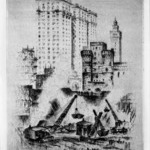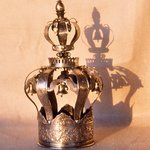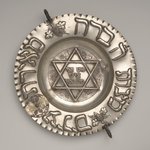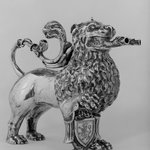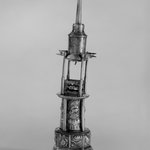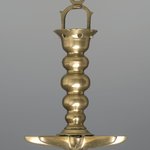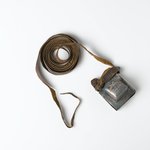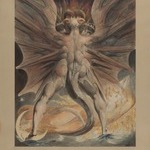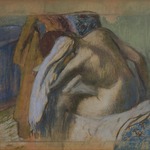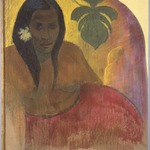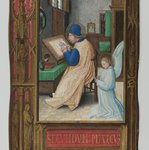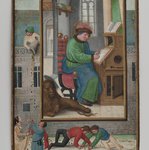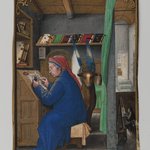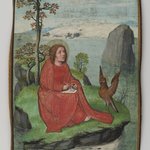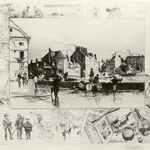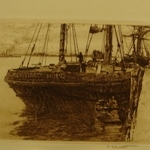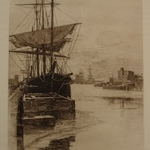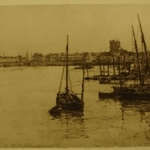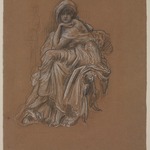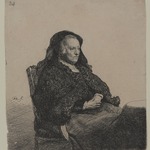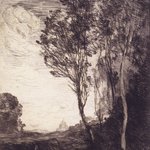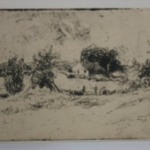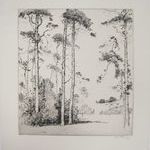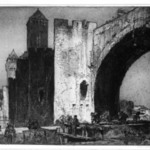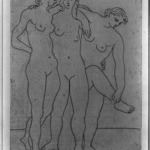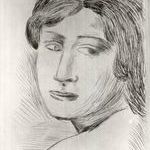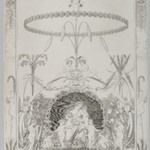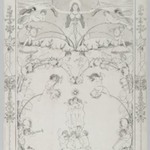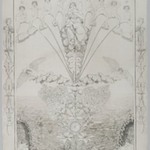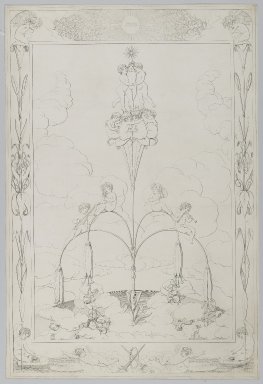
Morning (Der Morgen)
Philipp Otto Runge
European Art
These etchings are part of a rare first edition of Philipp Otto Runge’s Times of Day, a set of four large prints (Morning, Day, Evening, and Night) filled with elaborate floral decorations and angelic children meant to symbolize the eternal cycle of nature. For Runge, human life was part of this cycle, and the natural world was an expression of the divine.
Runge intended to use these designs for a monumental series of painted murals, but only one painting was ever completed. Landmarks of German Romanticism, a movement that emphasized emotion and the mysticism of nature, the etchings were appreciated by the movement’s leading figures, including the philosopher Johann Wolfgang von Goethe, who displayed a set of Times of Day in his music room and described the works as “enough to drive one mad, beautiful and crazy at the same time.”
Runge intended to use these designs for a monumental series of painted murals, but only one painting was ever completed. Landmarks of German Romanticism, a movement that emphasized emotion and the mysticism of nature, the etchings were appreciated by the movement’s leading figures, including the philosopher Johann Wolfgang von Goethe, who displayed a set of Times of Day in his music room and described the works as “enough to drive one mad, beautiful and crazy at the same time.”
PORTFOLIO/SERIES
Times of Day (Tageszeiten), Plate I
MEDIUM
Etching on wove paper
DATES
1803–1805
DIMENSIONS
Sheet: 28 1/4 x 19 in. (71.8 x 48.3 cm)
Mat: 39 3/4 x 30 in. (101 x 76.2 cm) (show scale)



MARKINGS
Stamp lower left verso
INSCRIPTIONS
Verso lower center in graphite: "38.623"; bottom right in graphite: "M42/4"
COLLECTIONS
European Art
ACCESSION NUMBER
38.623
CREDIT LINE
Museum Collection Fund
MUSEUM LOCATION
This item is not on view
CAPTION
Philipp Otto Runge (German, 1777–1810). Morning (Der Morgen), 1803–1805. Etching on wove paper, Sheet: 28 1/4 x 19 in. (71.8 x 48.3 cm). Brooklyn Museum, Museum Collection Fund, 38.623 (Photo: Brooklyn Museum, 38.623_PS1.jpg)
IMAGE
overall, 38.623_PS1.jpg. Brooklyn Museum photograph, 2006
"CUR" at the beginning of an image file name means that the image was created by a curatorial staff member. These study images may be digital point-and-shoot photographs, when we don\'t yet have high-quality studio photography, or they may be scans of older negatives, slides, or photographic prints, providing historical documentation of the object.
RIGHTS STATEMENT
No known copyright restrictions
This work may be in the public domain in the United States. Works created by United States and non-United States nationals published prior to 1923 are in the public domain, subject to the terms of any applicable treaty or agreement.
You may download and use Brooklyn Museum images of this work. Please include caption information from this page and credit the Brooklyn Museum. If you need a high resolution file, please fill out our online application form (charges apply).
The Museum does not warrant that the use of this work will not infringe on the rights of third parties, such as artists or artists' heirs holding the rights to the work. It is your responsibility to determine and satisfy copyright or other use restrictions before copying, transmitting, or making other use of protected items beyond that allowed by "fair use," as such term is understood under the United States Copyright Act.
The Brooklyn Museum makes no representations or warranties with respect to the application or terms of any international agreement governing copyright protection in the United States for works created by foreign nationals.
For further information about copyright, we recommend resources at the United States Library of Congress, Cornell University, Copyright and Cultural Institutions: Guidelines for U.S. Libraries, Archives, and Museums, and Copyright Watch.
For more information about the Museum's rights project, including how rights types are assigned, please see our blog posts on copyright.
If you have any information regarding this work and rights to it, please contact copyright@brooklynmuseum.org.
RECORD COMPLETENESS
Not every record you will find here is complete. More information is available for some works than for others, and some entries have been updated more recently. Records are frequently reviewed and revised, and we welcome any additional information you might have.
